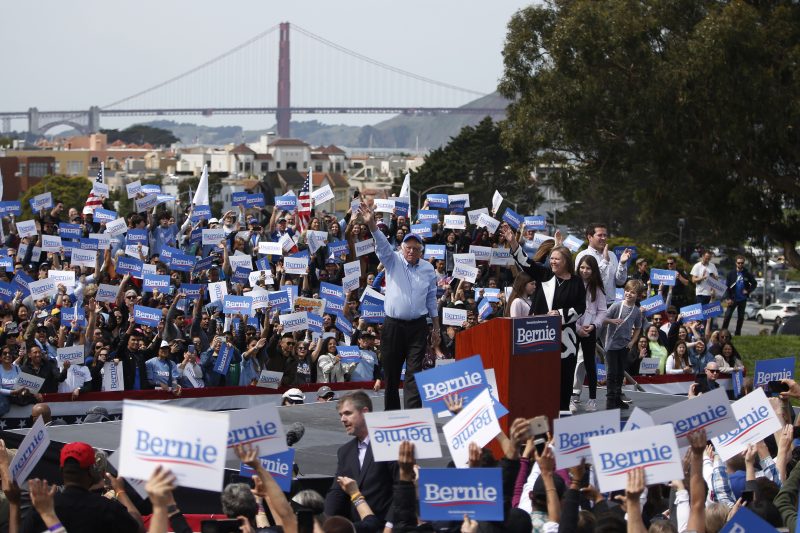As Democratic field expands, so does 2020 campaign map
US Senator Bernie Sanders addresses a campaign rally in San Francisco, California on March 24, 2019, one of several Democratic presidential primary candidates campaigning outside of traditional early-voting states like Iowa and New Hampshire (Stephen Lam)
Washington (AFP) – While first votes in the 2020 election cycle are still 10 months away, Democrats keen to distinguish themselves in a historically crowded field are expanding the traditional map, crisscrossing America to campaign in unexpected places.
Several states have been long overlooked in primary politics, particularly those in the heartland — derisively described by some as “flyover country” — where some states have few delegates at stake.
Among them is Utah. Often an afterthought in primary season, its influence could be further minimized in 2020 as residents vote on the same March day as a dozen other states including huge players California and Texas.
Yet Democratic presidential hopeful Elizabeth Warren heads to Utah on Wednesday for a Salt Lake City organizing event that may give her an early state-wide edge.
Last month, the liberal Massachusetts stalwart also campaigned in southern states Alabama, Mississippi and Tennessee, where candidates usually pay token interest until they jet in days before the primaries.
“I am running to be president of all the people, and that means getting out and talking to people all across this country, building a grassroot movement that stretches from coast to coast,” Warren told AFP ahead of her Rocky Mountain campaign swing, which also includes Colorado.
“That’s how we’ll win in 2020.”
Tradition dictates that in the runup to the voting that determines presidential nominees, candidates focus on the four early-voting states: Iowa, New Hampshire, Nevada and South Carolina.
But conditions are different this cycle, with more candidates from a single party vying for president — 18 Democrats by the latest count, after Congressman Eric Swalwell entered the race Monday — than any modern-day US election.
Experts say the wide field may complicate a candidate’s efforts to secure a large majority of early delegates, resulting in a prolonged primary battle.
Democrats seeking to challenge President Donald Trump are balancing the pressing needs of visiting the early states, introducing themselves to voters elsewhere, and meeting donors in wealth capitals like Los Angeles and New York to raise much-needed funds to propel their campaigns.
Democratic candidates visited at least 21 states and more than 100 cities in total in March as they sought money and support, mostly in the first four states but also in places like Florida, Georgia, Nebraska and Texas.
“I cannot recall a cycle where Democratic primary candidates were campaigning in states like Utah or other later states like they are this early in the process,” said James Curry, a political science professor at the University of Utah.
Candidates are taking the broader approach early, Curry said, because they anticipate the later states “may matter more than they typically have” in the process.
– Not just Iowa –
The incentive today is to plan for a longer primary nominations process, building up support and infrastructure in more states.
For decades, the prevailing narrative involved candidates essentially parking their campaigns in Iowa and New Hampshire, the first and second states to vote.
Jimmy Carter did that in Iowa and went on to win the White House in 1976. Thirty-two years later, it was Barack Obama who obsessed over the Hawkeye State.
“I don’t think that’s the reality any more,” Curry said.
Iowa remains at the political fulcrum of the nominations process, but candidates are increasingly going cross-country.
Candidate Julian Castro, a former Obama cabinet member, has pledged to campaign in all 50 states.
California, the state with the most delegates up for grabs, was once an afterthought because of how late it voted in the nomination calendar.
But it has shifted its primary forward aiming for a bigger role, joining massive Texas in voting on Super Tuesday next March. Campaigning will no longer wait in these two states until after the first four have their say.
Among those who have traveled to California is Bernie Sanders, who held large rallies there last month.
While California is a liberal stronghold, Sanders is also headed to the Rust Belt battleground states of Michigan, Pennsylvania and Wisconsin beginning Friday, seeking to cut into Trump’s backstop of white workingclass voters.
Candidate Beto O’Rourke has already completed a campaign road trip through those states plus Ohio, all of which Trump flipped in 2016 to win the presidency.
Wisconsin holds “exceptional value” because it has a stand-alone primary next April and is expected to be a critical battleground state in the general election, said political science professor Barry Burden of University of Wisconsin-Madison.
“There is also symbolic value in paying attention to swing states in the Midwest that Trump narrowly won and led to his victory,” Burden added.
Disclaimer: Validity of the above story is for 7 Days from original date of publishing. Source: AFP.


